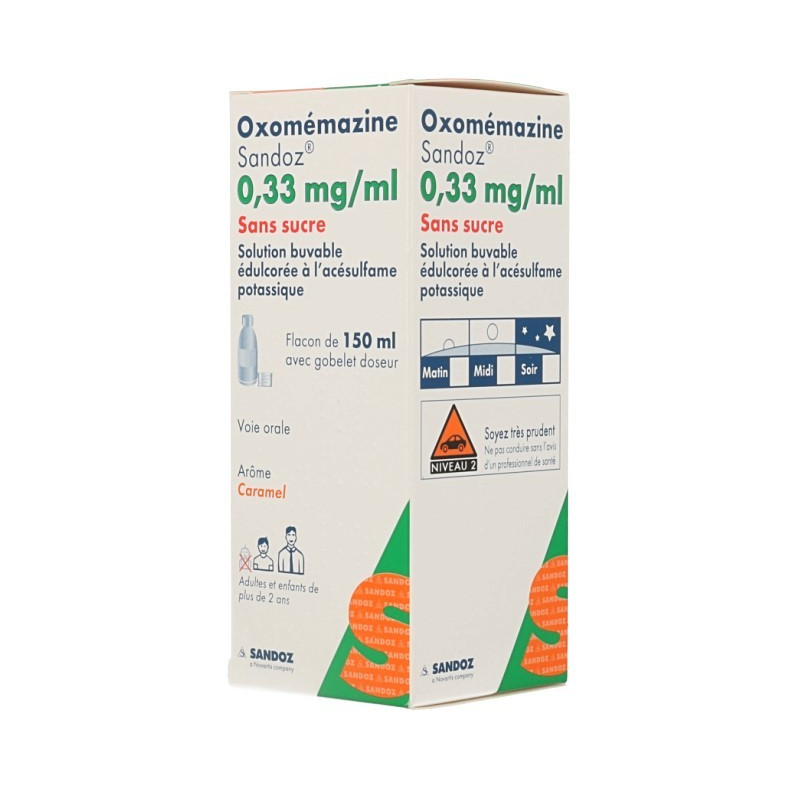
Zarbeil Syrup Dry or Oily Cough and Sore Throat 150 ml
Zarbeil cough syrup is a medical device indicated for adults and children over 2 years of age in case of both dry and wet coughs, and formulated with a honey base.
Free delivery for orders over 89€*.
* in metropolitan France and excluding drugs


This medicine contains a phenothiazine antihistamine. It has antitussive and sedative properties.
It is used in the symptomatic treatment of dry coughs, particularly those that occur at night.
This medicine is best taken at the onset of coughing, at intervals of at least 4 hours. Evening doses should be preferred because of the risk of drowsiness.
Usual dosage:
| p 5 ml | p 5 ml | |
| Oxomemazine | 1.65 mg | 1.65 mg |
| Sucrose | 3,7 g |
This medicine is not suitable for the treatment of wet coughs, which are a normal defense mechanism of the body, allowing the evacuation of mucus from the bronchial tubes.
Coughing is a symptom that may reveal a number of illnesses (allergy, heart, lung or digestive disease, etc.): consult your doctor if it persists for more than a few days.
Precautions should be taken in cases of heart disease, epilepsy, liver failure, renal insufficiency and in the elderly, particularly in cases of chronic constipation, prostate adenoma, dizziness or low blood pressure.
Oxomemazine, like other members of the phenothiazine family, may cause photosensitization reactions; avoid exposure to the sun during treatment.
Avoid alcoholic beverages: increased risk of drowsiness.
This drug may induce drowsiness, sometimes intense in some people. This drowsiness may be increased by alcohol or other sedative drugs. Driving and the use of dangerous machinery are strongly discouraged, especially in the hours following intake.
This drug should not be used in the following cases:
This medicine must not be combined with medicines containing cabergoline or quinagolide: risk of cancelling out their effects.
Inform your doctor or pharmacist if you are taking any other medication with atropinic or sedative effects (tranquilizers, sleeping pills, certain cough or pain medications containing opiates, antidepressants, neuroleptics, etc.).
Pregnancy:
The effect of this drug during pregnancy is not well known: only your doctor can assess the possible risk of its use in your case.
If taken at the end of pregnancy, monitoring of the newborn may be necessary.
Breast-feeding:
It is not known whether this drug passes into breast milk: as a precautionary measure, it is not recommended during breast-feeding.
Drowsiness.
Atropinic effects: dry mouth, accommodation disorders, urinary blockage, constipation, palpitations.
Orthostatic hypotension, dizziness.
Tremors, poor coordination of movements.
Agitation, confusion of ideas.
Allergic reaction, photosensitization.
Abnormal blood count.
Zarbeil cough syrup is a medical device indicated for adults and children over 2 years of age in case of both dry and wet coughs, and formulated with a honey base.
An all-natural syrup designed to relieve people suffering from wet or dry coughs, suitable for children aged 2 and over.
3C Pharma Sédatuxil Syrup 125 ml is a food supplement in the form of syrup, suitable for the whole family (children from 36 months). This syrup calms coughs.
It acts to facilitate breathing, to alleviate the throat, the pharynx and the respiratory tracts, to calm the mucous membranes.
5 extracts of plants specifically selected, of which:
- marshmallow, which relieves and soothes in case of dry cough and irritation of the throat,
- the plantain which alleviates in the event of irritation of the throat and the pharynx,
- the wallflower which contributes to maintain the respiratory tracts in good health.
Indication: Adults and children from 36 months.
The Hexaphyto brand offers its cough spray, a medical device for adults and children aged 8 and over. The spray provides rapid relief from coughs and irritation, without causing drowsiness.
Syrup based on plant extracts such as lanceolate plantain, ivy, white marrubus, drosera and eucalyptus honey.
These extracts help to regulate mucus fluidity in the case of wet coughs, by moisturizing and liquefying the mucus, thus encouraging expectoration.
In the event of a dry cough, they have a soothing effect on the mucous membrane, thanks to their emollient and protective action against external agents.
Cherry-cherry taste
Indication: Care for dry and oily coughs.
Boiron Mandarin Sucking Paste is a homeopathic medicine traditionally used as an adjuvant in the treatment of coughs.
Phytosun Arôms Pastilles Toux Sèche et Grasse 20 Pastilles is a medical device with fast action which relieves all the types of cough (dry cough and fatty cough) in particular associated with a cold.
Indication : To relieve quickly all the types of cough.
A dietary supplement recommended for babies aged 12 months and over to soothe dry and oily coughs without blocking the natural cough reflex. It is formulated withmarshmallow extract, which has a soothing action thanks to the mucilage in its composition, and chamomile extract with antibacterial and anti-inflammatory properties, which soothes throat irritations.
Indications: This medicine contains homeopathic remedies. It is used in the treatment of cough.
Description : STODALINE homeopathic syrup without sugar and without alcohol for dry coughs and fatty coughs.
Indications : This medicine is a complex (association) of homeopathic components. It is used in the homeopathic treatment of dry coughs.
- Cough syrup,
- Benign Acute Bronchial Affections.
Humer Toux is a medical device indicated in the treatment of the cough (dry cough and fatty cough).
From 8 years old.
Description: Homeopathic medicine traditionally used in the symptomatic treatment of hoarse cough and hoarseness.